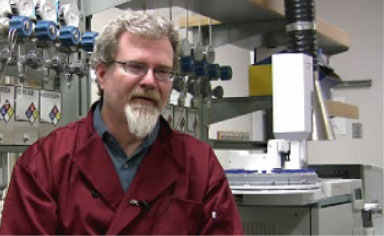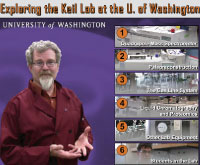"If you give us a thimbleful of sediment we can analyze it and tell you what kinds of plants, trees, and grasses
grew on the land before it eroded into the sea thousands of years ago. We can tell you that information to the species level, including what
types of fungus degraded the wood after it fell in the forest."
Click this image to explore the Keil Lab | |
While Rick's new equipment is made possible through his core funding from the National Science Foundation, he is quick to point out that he plans to leverage the equipment's use for SoundCitizen. "To be honest, there is no money for equipment in citizen science, so we were lucky that there was convergence within all the things I do," he says.
Rick inherited the lab of John Hedges, who 30 years ago pioneered lignin analysis, used for reconstructing types of woods, plants and grasses. There are typically 30 people in the lab, some of them graduate students sent there to learn specific techniques. "Lots of students get sent here and trained in lignin analysis, and we do that routinely," says Rick.
He shares his lab with Anitra Ingalls and Julian Sachs, and "the fact that there are three of us here allows me to be a little broader," says Rick. "The pressure to generate the funding all on my own to support a facility this size would use up all of my time - I wouldn't be doing any outreach. Having three people who study the same thing makes us all so much better than we'd be if it was just one of us."
|




